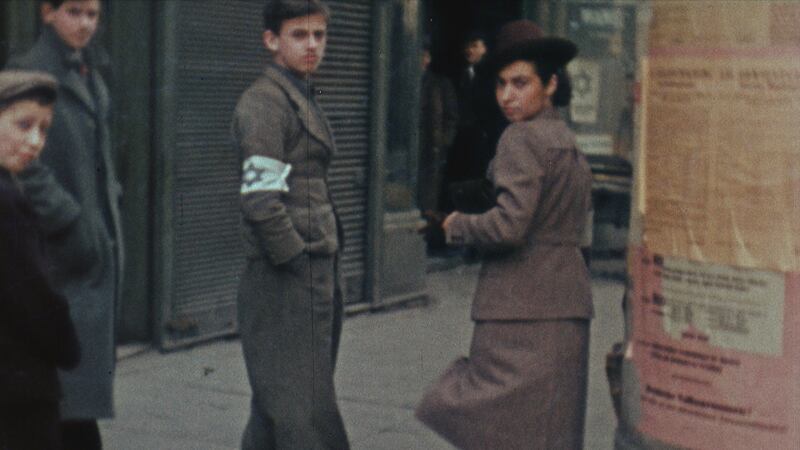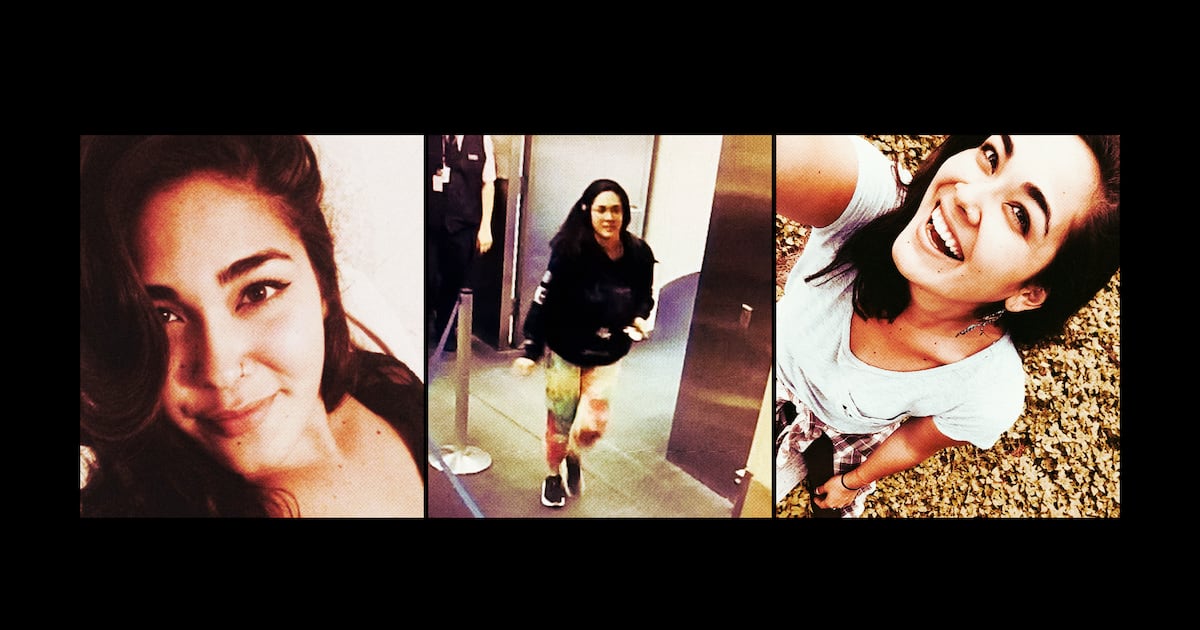Sometimes it seems we know everything there is to know about the Holocaust. It has been documented and dramatized so exhaustively that it’s hard to imagine existing material that hasn’t been mined already, much of it recycled again and again.
But in recent years, filmmakers have turned their cameras on succeeding generations of the Holocaust, to the children and grandchildren of survivors and the descendants of Nazi officers.
The 2013 documentary Hitler’s Children introduced us to the progeny of high-ranking officials and architects of the Third Reich, who are haunted by their family’s role in the Holocaust, by their fathers and grandfathers’ fantastical cruelty.
ADVERTISEMENT
Among them is Niklas Frank, whose father Hans Frank was Hitler’s personal lawyer and governor general of occupied Poland.
Niklas Frank travels the world giving lectures about his father’s responsibility for the murder of three million Jews. Bettina Goering, whose great uncle founded the Gestapo, had herself sterilized to prevent passing on “the blood of a monster.”
Frank is the subject of another documentary about what it’s like to be the son of one of Hitler’s senior henchmen: A Nazi Legacy: What Our Fathers Did, directed by David Evans, which debuts at New York’s Tribeca Film Festival this weekend.
The film examines the complexities of Nazi father-son relationships from two wildly divergent perspectives.
Niklas—now in his ‘70s—has, like most prominent children of the Third Reich, spent his life absorbing his father’s guilt and condemning his cowardice and brutality.
His views could not be more different from Horst von Wächter, who refuses to accept that his father, the Austrian Nazi Otto von Wächter, was politically responsible for mass murder.
The film also features Philippe Sands, a renowned British human rights lawyer, whose grandfather's family was executed under the orders of Otto von Wächter and Hans Frank. (Sands' grandfather survived).
Nearly five years ago, Sands met Niklas while doing research for his forthcoming book on two international lawyers who prosecuted Hans Frank at Nuremberg.
One was instrumental in developing the idea of “crimes against humanity;” the other coined the term “genocide.”
Niklas suggested Sands meet Horst, too, since their fathers worked closely together during the reign of the Third Reich and the Holocaust.
Otto von Wachter was Hans Frank’s deputy and, from 1942 until 1944, the governor of Nazi-invaded Lemberg, capital of Galicia (now the city of Lviv, in Ukraine).
The film opens with Sands visiting Horst at Schloss Haggenberg, a derelict, 17th-century castle north of Vienna, Austria. Horst lives here with his wife in three of its many rooms, one of which houses his father’s entire library.
Horst shows Sands the Wächter family photo albums, with happy images of birthday parties and skiing holidays interspersed among haunting photographs taken inside the Warsaw Ghetto.
We also see a picture of the Führer, the letters “A.H.” written beneath; Wächter with Himmler in Lemberg; the Wächters at the Frank’s vacation home.
While a select few of these photographs were published in the Financial Times for a story Sands wrote about Horst, most of the still and moving images in “A Nazi Legacy” have never been made public.
Sands, who narrates the film, says looking at these images “felt dirty, as though I was complicit in a voyeuristic sort of way, looking on the inside of horror.”

Horst knows Sands’ heritage, but he is plainly unashamed as they flip through his family albums, betraying little awareness of the discomfort they evoke in Sands.
There’s a faint hollowness in Horst’s voice during this scene that we hear at other moments in the film. The more we come to recognize and expect it, the more jarring it sounds.
But this is not the voice of a callow and unfeeling person. At times, Horst resembles the six-year-old boy whose life was upended after the war, who was devastated by “this feeling that everything is finished, there is no future for you.”
His voice cracks and drops off at the memory of British and American warplanes dropping undetonated bombs into the lake near his childhood home.
He blinks away tears while recalling the rupture of his family after the war, when his father hid in Austria before being granted asylum from a Catholic church in Italy. (He fell ill and died shortly after his identity was revealed.)
But what of the fear of the young Jewish children in Galicia whom Horst’s father sent away to concentration camps? What of the families that were separated and would never see each other again?
His father wasn’t anti-Semitic and never signed off on these orders, Horst insists at every turn. His father was a good man who would have been murdered himself had he rebelled against the regime.
Still, Horst has long felt guilty for his own connection to that regime, especially as a young man. His mother wanted him to become a lawyer, but he chose to assist a Jewish painter instead.
“The question of the historical responsibility of my father is a very complex one,” Horst says. “But the racial theory of Germans being supermen…my father was against this from the beginning.”
Niklas is as unbending as Horst. He carries with him at all times a grisly picture of his father after he was hanged at Nuremberg.
“On the one hand, to be sure that he’s really dead,” he tells Sands, pulling out the photo. “But on the other hand, and this is what haunts me all my life, because the Germans know exactly what can happen if you are losing civic courage, if you are losing democracy. It can lead to extermination camps. People of this merciless kind of living and killing are still alive in Germany.”
Niklas refuses to forgive, Horst refuses to condemn. The two are friendly despite their contrary views, though each one tries to convince the other that he’s right.
When they appear together at a panel in London moderated by Sands, Niklas criticizes Horst on stage for his stubborn persistence in exonerating his father, but still addresses him as a “dear friend.”
Yet as the film progresses, both Niklas and Sands begin to lose patience with Horst.
They provide irrefutable evidence of Otto Wachter’s crimes. Niklas reads a speech his father gave in 1941 announcing the implementation of the “Final Solution” in Galicia— the Grossaktion—congratulating Horst’s father for his good work as governor. (A month later, at least 75,000 Jews would be dead.)
Sands then produces a document from 1945 indicting Horst’s father on charges of murder in Poland.
But Horst continues to make excuses: Poland was occupied by enemy Soviets at the time the letter was written; the charges only accuse him of murdering Poles, not specifically Jews.
Later, Sands brings Horst and Niklas to a meadow outside Lemberg, the site of a mass grave where Sands’ grandfather's family and some 3,500 Jews were shot dead in 1943. Horst paces and picks apart a Queen Anne’s Lace blossom.
He wants the “exact names” of people who commanded and carried out the executions, from the civil government to the SS soldiers.
Sands pleads with him to accept that not wielding a weapon doesn’t absolve his father of mass murder. Horst quietly disagrees: his father was not like the cold-blooded auxiliary police, and he would never have authorized such brutality.
For many years, Horst’s view that SS executioners were savage anti-Semites was not an uncommon one. It was also widely believed that they had no choice but to kill, that they were victims of a terrorist regime. But both theories were invalidated in Christopher Browning’s 1992 book, “Ordinary Men.”
Browning’s book is a case study outlining how ordinary men—postmen and policemen before the Nazis came to power—became extraordinary killers as SS officers under the Third Reich.
Horst’s father is even less defensible as a high-ranking official, who, like Hans Frank, would have ordered the “resettlement” of Jews from behind a desk.
As Niklas says of his father in the film: “He was raised Catholic and he studied law, so he knew by heart what was wrong. And he went on and on to the ghettos. He was too much of a coward. He knew he was committing crimes. And he never had the bravery to say, Ok, Mr. Hitler, that’s it.”
Not far from Lviv, the three of them stumble on an annual commemoration of the Galicia SS division, including a ceremony to bury newly discovered remains of German and Ukrainian soldiers who fell in the area during the war.
One of the narratives Horst clings to throughout the film is how his father was venerated by Ukrainians in Galicia. He is delighted, then, when Ukrainians at the commemoration site confirm that his father was a good man.
Horst beams with pride. He chats with one man who wears a Swastika around his neck. He climbs into the back seat of an old Nazi car, his father's perch.
It’s a turning point for Niklas, who privately tells Sands that he thinks Horst would be a “new Nazi” were it not for his age.
But Sands is not convinced that Horst would promote Nazi propoganda.
“I’m rather protective of Horst,” Sands tells me. He respects that Horst was straightforward from their very first meeting, willing to show incriminating family photographs to a stranger. He also respects Horst’s willingness to speak publicly about his unorthodox opinions, a move that has estranged family members.
Sands introduced Horst to the Holocaust Museum in Washington D.C., and Horst has since given his entire family archives in digital form to the museum: his father’s and mother’s diaries and love letters between 1926 and 1945, which will be made public in August.
“He has a genuine desire to make this information available to people,” says Sands. “He’s totally committed to it, even if his interpretation of this information is not, in my opinion, balanced or valid.”
But what exactly is motivating Horst’s deluded idolization of his father?
Speaking to Sands after Horst and Niklas’s debate in London, psychoanalysts offered tidy explanations of filial devotion—the idea of the child who loves the parent how matter how terrible that parent has been.
This certainly is true of Horst, but his rote apologies for his father’s legacy may be more about maternal devotion. “Horst was incredibly close with his mother,” Sands tells me, though the film doesn’t get into that relationship.
“People find ways to justify what they have done,” says Sands, who has adjudicated similar cases of human rights violations in Yugoslavia, Rwanda, and—currently—Libya.
For him, the most powerful moment in the film was visiting the courtroom in Lviv.
“It felt very real being there because my day job frequently finds me in a similar situation,” says Sands.
“The scale and the horror is perhaps different, but the fundamental issue of the human being caught up in something that is bigger than him, like Hans Frank, is the same. I don’t think Frank was born a bad person, but he had weaknesses that allowed him to justify mass murder. These are lessons for all of us.”
A Nazi Legacy: What Our Fathers Did plays on Sunday, 5.30pm, Monday 6.15pm, Wednesday, 5pm, and Thursday 3pm. Screening details here.





